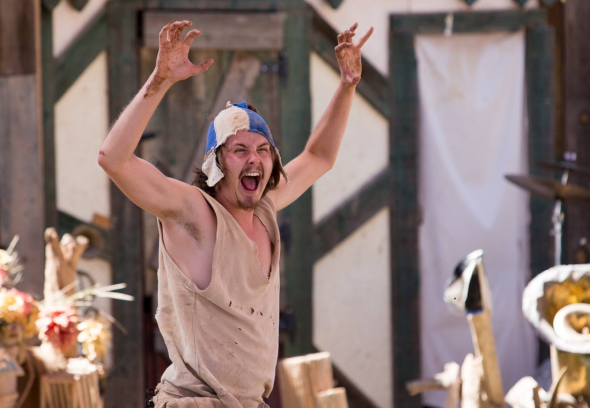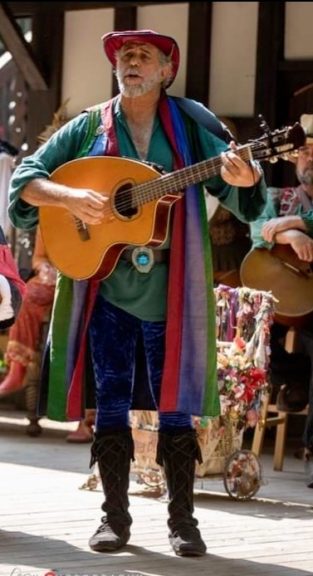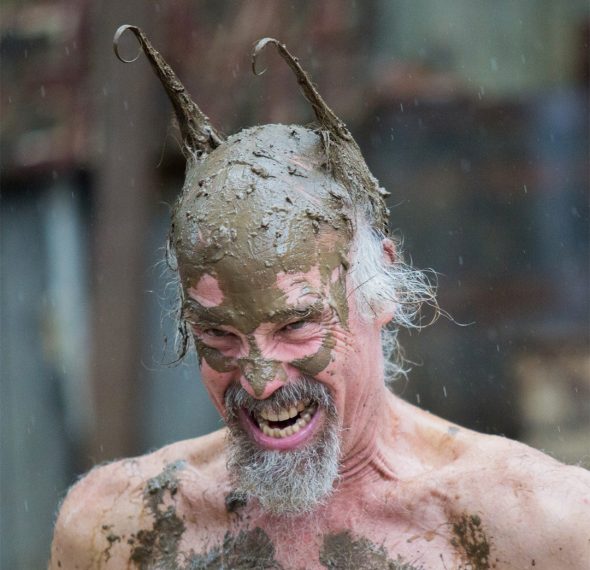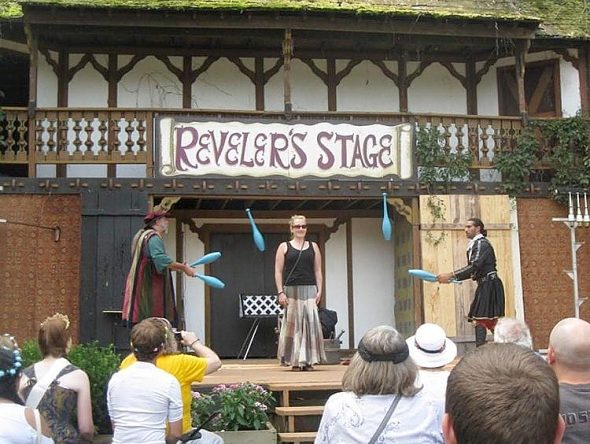
Lifelong Yellow Springs resident and actor Elliot Cromer is among many villagers who spend their autumn weekends performing and working at the Ohio Renaissance Festival. Each February and March, Cromer travels to the Arizona Ren Fest to don the role of Chessterton Sethsterton, a muddy lunatic in the festival’s “Wyldman Show.” (Photo by Stephen Geis)
Yellow Springs goes to the Ohio Renaissance Festival
- Published: October 9, 2023
It may come as no surprise that a number of performers at the annual Ohio Renaissance Festival have a home in Yellow Springs.
Just 22 miles apart, the village and the 30-acre fairground in Harveysburg are loci of artistry and an unending cast of characters beyond imagination.
Now in its 33rd year, the festival draws over 165,000 visitors annually to a fictional 16th-century English hamlet — dubbed “Willy Nilly-on-the-Wash” — to indulge in jousting matches, slap-stick comedy shows, dulcimer performances, period shoppes, larger-than-life turkey drumsticks and so much more.
All of these elements of this mythical place are on plain view for visitors to the fest, but behind the scenes, a more worldly kind of magic takes place regularly — the magic of healing.
Last week, the News spoke with several Ren Fest performers about their roles, as well as with local physician Dr. Stuart “Skip” Leeds, who works out-of-view to keep them healthy and robust for their many live performances, which run Labor Day through the end of October.
The local acts
Longtime Ren Fest performer Carl Asch, 67, has occasionally called Yellow Springs home since 2016. In addition to playing guitar and tin whistle in a roving Celtic band at the festival, Asch stages the “Oops! Comedy Knife Throwing” show six times every weekend — a death-defying act of sword juggling, magic and comedy.
“It’s particularly interesting because we’re not very good,” Asch told the News last week with a wink. “I like to tell audiences that the other guy on stage is my seventh partner — ‘Just don’t tell him that.’”

Village resident Carl Asch is performers at the Ohio Renaissance Festival, which continues its 2023 season for four more weekends. At the festival, Asch is an Irish musician and sword juggler. (Submitted photo)
Like many of the performers at the Ren Fest, Asch is never in one place for very long; he travels year-round, taking his act to various Renaissance fairs and festivals across the country. But from September through October, Asch lives in Yellow Springs.
It’s been a lifetime of performance for Asch. In his earlier years, he did magic, juggling acts and rope-walking on the streets of Italy, France and New York City. For some time, he was an Italian jester in Disney’s Epcot. When he transitioned to festival life in the mid-’80s at Key Biscayne, Florida, Asch said he immediately fell in love.
“I felt like I was home,” he said. “These festivals are just beautiful; they’re like a totally different reality.”
Village resident Elliot Cromer, 30, also found his kindred at the faire.
“It’s a place where people can safely live out their fantasies,” Cromer said in a recent interview. “And there, you can meet a lot of weird people and make a lot of friends.”
A lifelong performer, whose acting roots can be traced to the boards of the Yellow Springs Kids Playhouse, Cromer has, for eight years, played the role of a pipe merchant at the Ohio Ren Fest. He manages Danny Boy Pipes, a tobacco pipe and accessory shoppe, with wares from Germany, Turkey, Italy, Poland and elsewhere.
“A pipe gets better the more you smoke it, so it can take a lifetime to master,” Cromer said.
Cromer’s theatrics don’t stop at the pipe stand, though. Every February and March, the actor travels to the Sonoran Desert to perform in the “Wyldman Show” at the Arizona Renaissance Festival.
“We’re in Medieval England in 100 degree heat with very little grass and hardly any trees,” he said with a laugh. “It’s truly a testament to the human imagination.”
As Cromer explained his mud-based show: “We like to say it’s a live-action cartoon. I play Chesstherton Sethsterton alongside Dr. Cranius Lunch and Captain Jimi. It’s a show within a show; we audition to see who will play the role of the Wyldman — and usually it’s me.”
And who is the eccentric, odd-ball professor Dr. Lunch, but Yellow Springs resident Jonathan Crocker.

Jonathan Crocker is one of the “mud men.” Shown here, Crocker just “transformed” into the monstrous Grendel during a muddy rendition of “Beowulf.” (Photo by Bo Maupin)
While Crocker, 64, spends each February and March in the southwest with Cromer, he runs the Ohio Ren Fest’s famed “Theatre in the Ground” — known simply as “the mud show” — September through October. In the “muditorium,” Crocker’s three-man troupe performs four shows every Saturday and Sunday: muddy renditions of “Beowulf,” “Dante’s Inferno,” “The Viking Show” and, new this year, “Jerkules.”
Like Asch, Crocker’s festival career began in the ’80s as the village idiot for a fair in upstate New York. He returned to his native Ohio — where he grew up in the ’60s and graduated from The Antioch School — in 1990 when the Ohio Renaissance Fair first lowered its drawbridge.
“I got a call from the entertainment director who heard about my mud shows and asked me if I could be one of the anchoring acts,” Crocker told the News. “Thus began a new leg in my career.”
Thirty-three years later, Crocker still sees his performances in the 12-foot mud pit not as sordid work, despite all the muck, but rather a continuation of the festival’s cultural tradition of radical self-expression.
Crocker spoke about a recently published Smithsonian Magazine article, which outlined the history of the country’s first Renaissance Pleasure Faire, staged in Los Angeles in 1963. According to the article, the Faire — the brainchild of a public school teacher who refused to make a political loyalty oath — was “inextricably linked” to Cold War-era mass hysteria known as the “Red Scare,” and drew in other blacklisted or graylisted artists and creatives.
“Renaissance festivals might not have been the birth of counterculture in the ’60s,” added Crocker. “But [the Pleasure Faire] was pretty much the first big gathering of people who were isolated by the Red Scare and were looking for ways to have an artistic life — to be themselves.”
Asch agreed with Crocker’s historical reflection.
“There’s this lovely correlation between the Renaissance — that is, the rebirth of science and art after the Dark Ages — and the colorful 1960s — which came after the black-and-white conformity of the 1950s,” said Asch.
Asch continued: “The Ren Fest is a safe place to play — the actors, the guests, everyone. That’s the beauty and the magic of it all.”
Not your medieval medicine
Of course, there would be no Renaissance Festival — in Arizona, Ohio or anywhere else — without healthy performers. The Queen can’t have a cough, nor should the guard suffer from gout.
Enter: Dr. Skip Leeds, longtime Yellow Springs resident, family physician and associate professor of family medicine at Wright State University School of Medicine.
Since last October, Leeds has conducted weekly clinics at the Ohio Renaissance Festival, providing free, walk-in healthcare to festival performers, merchants and staff.
“These ‘Rennies’ — as they call themselves — are a dramatically underserved population,” Leeds said in an interview earlier this month. “The majority of these people have no insurance, and those who are poor enough to qualify for Medicaid have trouble using that coverage when they’re going from state to state. They’re essentially migrant or itinerant workers.”
As Leeds told the News, he treats festival workers for anything from festering lance wounds to stress disorders — from the orthopedic to the psychological.
But owing to the limited resources in a pop-up clinic, Leeds finds himself helping his Renaissance patients get connected to resources using what he calls indirect, or systems-based practices.
“I’ve done a lot of pro bono and volunteer medicine throughout my career, so I have a pretty high comfort level with low-resource environments where you literally have just two antibiotics and an antihypertensive at your disposal,” Leeds said. “So, a big part of my work there is to find out how to get those people what they need: where to find crutches, where the nearest physical therapist is and so on. That’s what systems-based practices are.”
His work, Leeds explained, is facilitated through the Renaissance Entertainers Services Crafters United, or RESCU, Foundation, a national nonprofit that promotes and maintains the well-being of fair and festival workers through financial assistance, advocacy, education and other programs. According to its website, RESCU has disbursed nearly $2 million in direct medical aid since its 2003 inception.
Since linking up with RESCU and beginning his work at the Ren Fest, Leeds and his ever-rotating team of Wright State medical students have seen many dozens of festival workers. His weekly clinics take place every Saturday, 8–10 a.m., before “Cannon” — that is, when a cannon gun is fired and guests begin entering the festival.
“One week, I took a big splinter out of a guy’s foot,” Leeds said with a smile. “His job involves him walking on wooden planks, so these splinters are a repeated occupational hazard. I recommended shoes; he said that wasn’t going to happen. I said, ‘See you soon.’”
He’s also seen patients who’ve had life-threatening conditions such as diseases and potentially malignant masses, but in the interest of patient confidentiality and privacy, Leeds was unable to elaborate on some of his more serious cases.
“These people are beset by all kinds of diseases and work-a-day medical problems that start small, but end up being something big, because they usually can’t get the care they need,” Leeds said.

Carl Asch’s juggling act. (Submitted photo)
Asch, the “Oops” sword juggler, said he went to Leeds’ clinic last year.
“I had something weird going on with my foot; he gave me an injection of something and the problem went away!” Asch said. “So, that was awesome.”
The muddy Crocker and Cromer both said that while they haven’t yet taken advantage of Leeds’ free services, they’re still grateful to have him on stand-by owing to the risks inherent in their dirty work.
“The risk of infection is always there — especially ear infections,” Crocker said. “But good hygiene protocols do a fine job of preventing that. Still, there’s all the scapes, cuts, bumps and bruises that are possible.”
Even though Leeds volunteers his weekends to offer the “Rennies” medical services, and while he has to don his white lab coat rather than a more flamboyant garb befitting a fantasy healer, he nevertheless is proud of his weekly work at the festival.
“I’m at a place in my life where I think a lot about giving back,” he said. “There’s something magical about the physician-patient relationship. Just the mere fact that someone is going to be there for you, to care for you when no one else will, is healing. It’s miraculous.”
The Ohio Renaissance Festival, located at 10542 S.R. 73, Harveysburg, OH, runs for four more weekends: Oct. 7–8, 14–15, 21–22 and 29–29. Tickets, which start at $32 for adults, can be purchased online at http://www.renfestival.com.
To learn more about the medical services and advocacy offered to Renaissance fair and festival works across the country, visit http://www.rescufoundation.org.
The Yellow Springs News encourages respectful discussion of this article.
You must login to post a comment.
Don't have a login? Register for a free YSNews.com account.











No comments yet for this article.